GBC College Trains Future Zonal Supervisors
By Madhava Smullen | Nov 18, 2019
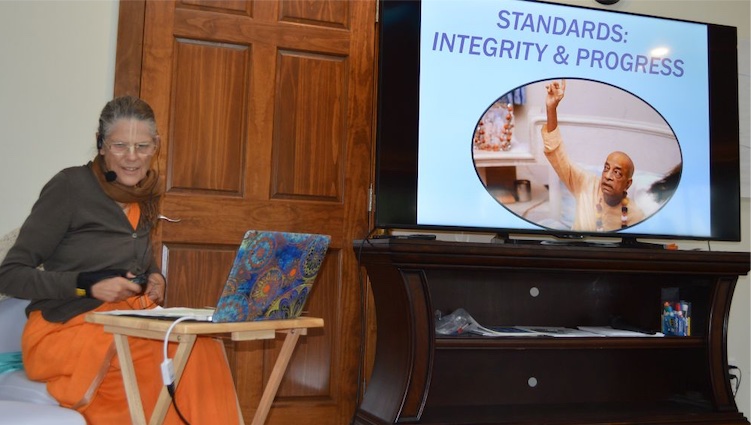
Twenty-five devotees from all over the US and Canada began a Zonal Supervisor Training program, run by the GBC College for Leadership Development, to learn how to become top leaders in ISKCON recently.
Since 2015, the GBC College has trained five groups of leaders in India, one in Russia, one in Latin America, and one in Central Asia – and it is now launching in North America for the first time.
Candidates were hand-picked by their respective GBCs and vetted by the GBC College Admissions Committee. They are reportedly the most diverse group that the College has trained thus far—in terms of age, education, experience, generation, ethnicity and gender.
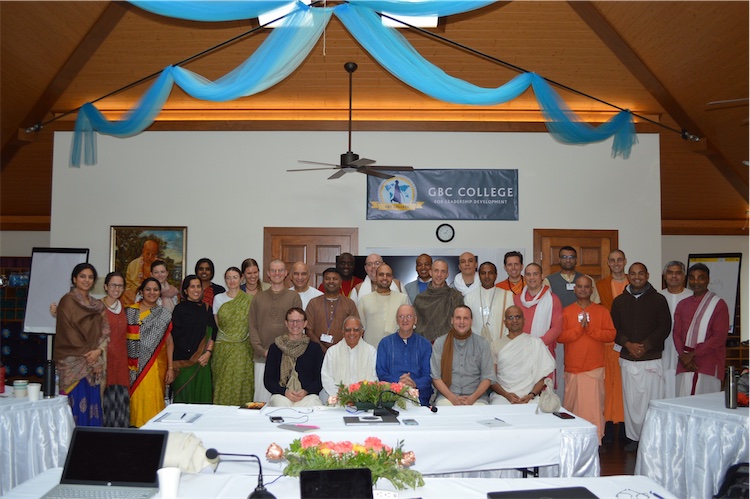
The whole group at GBC College’s Zonal Supervisor Training Program in New Vrindaban, North America
The GBC’s aim is to train all levels of leaders in ISKCON for succession; the current program is training candidates to become zonal supervisors. “The GBC has divided the world into 168 zones, and each GBC oversees about five zones,” explains College President Rupanuga Das. “One zonal supervisor will be assigned to each zone, and will assist the local GBC in managing it.”
The seventeen-month Zonal Supervisor Training program began with its first two-week residential in New Vrindaban, West Virginia from October 24th to November 5th. The New Vrindaban team, lead by Jaya Rama Das and Mahasundar Das, made a generous offer to host the residential session for free, at no cost to the students or faculty.
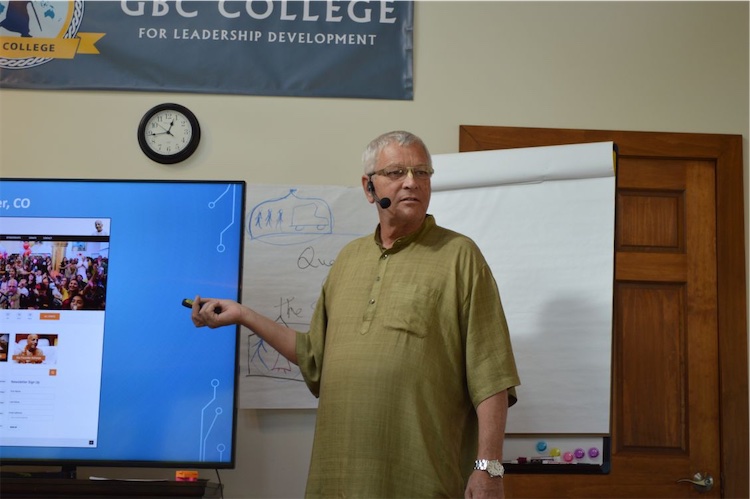
Gopal Bhatta Das teaches Eight Steps for Leading Change
The qualified Vaishnava teachers leading the program included three of Srila Prabhupada’s disciples—HH Bhakti Charu Swami, Gopal Bhatta Das, and Malati Devi Dasi; five with a Ph.D.—Kaunteya Das, Sri Prahlada Das, Bala Govinda Das, Radhika Raman Das and Rupanuga Das; two renowned experts—Vraj Vihari Das and Radheshyam Das; and a guest speaker—Sri Radhe Govinda Devi Dasi.
Each day of the program began at 5:00am with mangala arati, japa, and Guru Puja. At Srimad-Bhagavatam class, teachers spoke from the fourth canto, chapter sixteen, discussing the leadership style of ancient king Maharaja Prithu. Students were also encouraged to give class, including Prabhupada Priya Dasi, who spoke on Govardhan Puja day, and whose brilliant lecture outlined from Indra’s behavior how not to lead. Other student speakers included Yugal Kishore Das, Mangala-Arati Dasi, Dronacharya Das, Srutisagara Das and Vrinda Sundari Dasi.
Lessons then ran from 10am to 5.15pm daily, with breaks. Among them were “Srila Prabhupada: The Founder Acharya,” and” How to be Srila Prabhupadanugas,” by Bhakti Charu Swami.
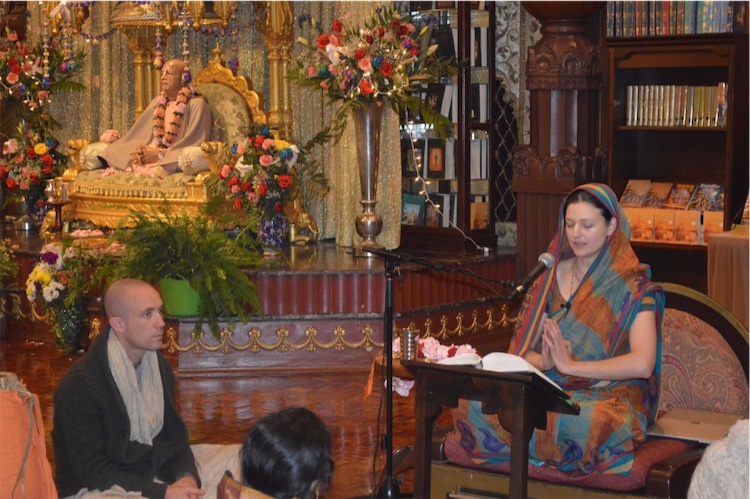
Student Vrinda Sundari Dasi gives Bhagavatam class on learning leadership from Prithu Maharaja
“Using anecdotes from his personal experiences with Srila Prabhupada, Maharaja inspired our leaders in training to imbibe Prabhupada’s leadership style,” Rupanuga says. “He also went over principles that Prabhupada emphasized, such as purity is the force, unity in diversity, and cooperating with one another.”
Meanwhile Gopal Bhatta Das, co-chair of the GBC’s Organizational Development Committee, discussed ways in which ISKCON can market itself, lead change, and sustain the kind of growth needed to expand from the current 800 centers around the world, to every town and village.
“There is lots of potential for growth for ISKCON, but we are not making the moves that we should be making if we want to become a mainstream religion,” says Rupanuga.
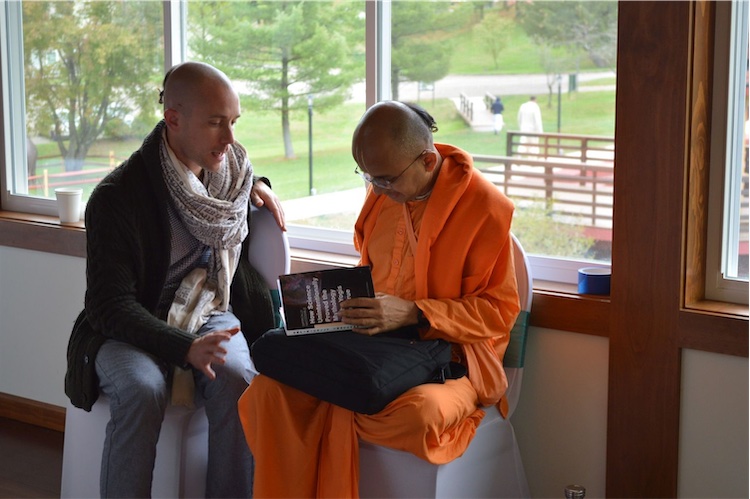
Students spend time studying and connecting with each other
Kaunteya Das, a member of the GBC Strategic Planning Team, spent a full day looking in-depth at strategic planning with students. Using this process, the GBC analyzes ISKCON’s strengths, limitations and opportunities to grow; the current audience they are serving; potential audiences they would like to serve; and those things that are keeping potential audiences from flocking to ISKCON temples.
With this assessment, they then create a vision statement of where they want to be in the next five to ten years; chalk out a plan to get there; and identify specific goals in various areas such as devotee care, outreach, etc, marking out who will do them and when.
Other classes in the residential program included Leadership Lessons from Srimad-Bhagavatam; Learning to See Good in Others; Overcoming Faultfinding Tendencies; Servant Leadership; Virtue, Authenticity, and Mental Discipline; Sadhana for Leaders; Learning about Personality Types; Inspiring Trust; Team Building; Collaboration; and Accountability.
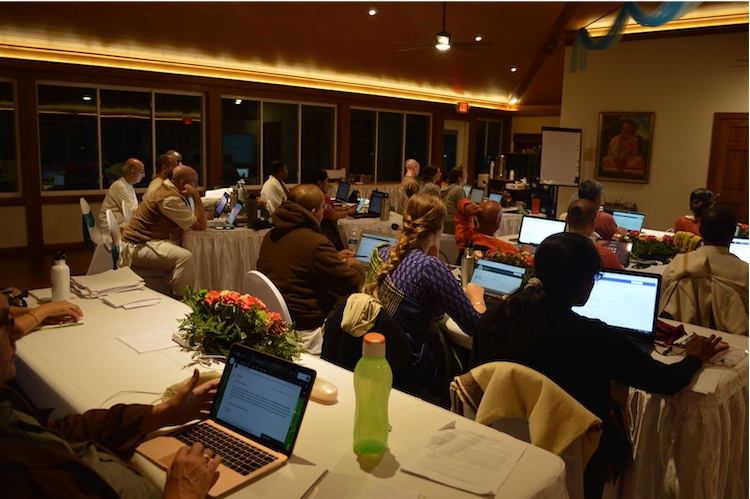
The GBC College group hard at work
There was also Upholding ISKCON Standards with Malati Devi; Leadership and Management in Gaudiya Vaisnava History with Radhika Ramana (Dr. Ravi Gupta); and conflict resolution and mediation with Vraj Vihari Das.
“Along with some lectures, the classes included breakout sessions where leaders were presented with real life situations in ISKCON and had to use the skills they’d learned,” Rupanuga says.
The residential also included a one day break during which students visited historic sites of Srila Prabhupada’s pastimes in New Vrindaban; as well as time for them to get to know each other and share local initiatives they were working on.
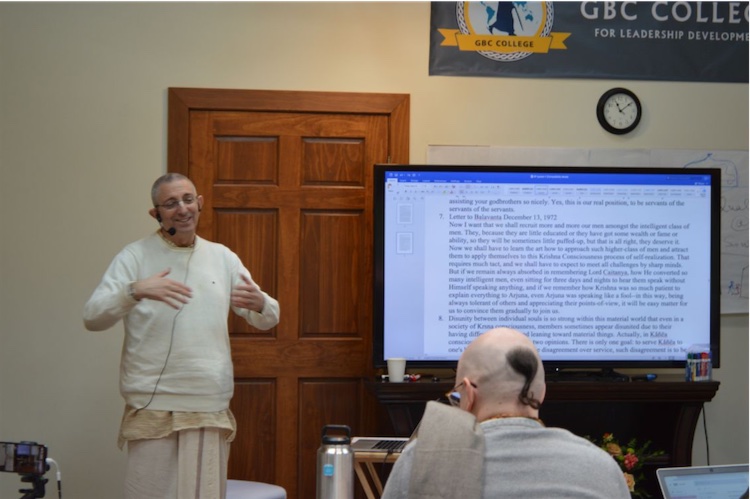
Vraja Vihari Das teaches conflict resolution
The New Vrindaban residential program was just the beginning of the seventeen-month Zonal Supervisors Training Program. Next, leaders will take distance learning online courses for nearly a year from November 12th 2019 to October 2020.
These will include Principles of Temple Administration, Fundraising, Book Distribution, Basic Finance and Accounting, Community Development, Developing Bhakti Habitats in East and West, Living ISKCON Law, Vaisnava Sadachar, Why Religious Movements Succeed or Fail, Managing Farm Communities, and Child Protection in ISKCON.
Parallel to the online learning, leaders will plan Action Learning Projects, or ALPs – real life projects they’ll work on with a local team of five or six other devotees in their zone. Part of this will involve teaching principles of Strategic Planning to others.

Kaunteya Das teaches Strategic Planning
“The purpose of teaching to learn is that when we teach, the retention rate is ninety percent, compared to just five percent rention after hearing a lecture,” says Rupanuga.
Students will then take a second residential, once again at New Vrindaban, in October 2020, followed by more online courses until January 15th 2021. Parallel to that, they will continue their action learning project to execution.
Finally, those who successfully complete the program will graduate in front of the entire GBC body at the GBC’s Annual General Meetings in Mayapur in February 2021, where they will be presented with a diploma.
As with any college, not all who receive the diploma will necessarily get the job, but they will be qualified for the position and can be nominated by a GBC to serve as a zonal supervisor.
According to Rupanuga Das, this kind of training was desired by Srila Prabhupada. In a January 1973 letter to Satsvarupa Maharaja and Hridayananda Maharaja, he wrote, ‘There is need for intelligent young men, to train them up as future leaders and preachers to go all over the world for spreading the message of Lord Caitanya Mahaprabhu.”
“This was Prabhupada’s plan,” Rupanuga says. “He wanted all GBCs to be trained up. He would have GBCs come and shadow him to learn how he was managing affairs. So this is the mandate of our Founder-Acharya. We are simply following in his footsteps.”















